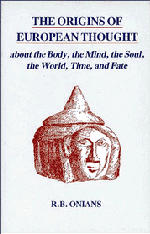Book contents
- Frontmatter
- Contents
- Preface to the first edition
- Preface to the second edition
- Introduction: The Earliest Greeks
- PART I THE MIND AND THE BODY
- PART II THE IMMORTAL SOUL AND THE BODY
- Chapter I The ψυχή
- Chapter II The Genius, Numen, etc.
- Chapter III Anima and Animus
- Chapter IV The Knees
- Chapter V The Strength
- Chapter VI The Stuff of Life
- Chapter VII River-Worship and some Forms of the Life-substance
- Chapter VIII The World: Beginnings of Greek ‘Philosophy’
- Chapter IX Death and Cremation
- Chapter X The Offerings to the Dead and to the Gods
- Chapter XI Nectar and Ambrosia
- PART III FATE AND TIME
- ADDENDA
- Indexes
Chapter III - Anima and Animus
Published online by Cambridge University Press: 06 August 2010
- Frontmatter
- Contents
- Preface to the first edition
- Preface to the second edition
- Introduction: The Earliest Greeks
- PART I THE MIND AND THE BODY
- PART II THE IMMORTAL SOUL AND THE BODY
- Chapter I The ψυχή
- Chapter II The Genius, Numen, etc.
- Chapter III Anima and Animus
- Chapter IV The Knees
- Chapter V The Strength
- Chapter VI The Stuff of Life
- Chapter VII River-Worship and some Forms of the Life-substance
- Chapter VIII The World: Beginnings of Greek ‘Philosophy’
- Chapter IX Death and Cremation
- Chapter X The Offerings to the Dead and to the Gods
- Chapter XI Nectar and Ambrosia
- PART III FATE AND TIME
- ADDENDA
- Indexes
Summary
Let us now look at animus and anima. The problem of their original meanings is one of great difficulty, owing to the nature of the terms themselves, two words obviously cognate, differing in fact only in declension and gender and both connoting entities or substances of the nature of wind or breath (cf. ἄνεμος), intangible, invisible, and easily confused. We have very little evidence before about the beginning of the second century b.c. By the fifth century b.c. the Greeks had completely changed and confused their conceptions of ψυχή and θυμός, so that ψυχή, from meaning originally the vaporous life-soul associated particularly with the head, had come to include the θυμός in the chest, and the original identity of θυμός with the physical breath was obscured. This evolution was, as far as can be seen, not hastened by foreign influences. The Romans, though more conservative by nature, were increasingly influenced by Greek thought, educated Romans by the various schools of philosophy. These later and more personal developments are fairly obvious, but even without them there remains confusion and overlapping of terms. The present state of the question may be illustrated from the recent survey of ‘Ancient Italian Beliefs concerning the Soul’ by Professor Rose: ‘anima is the breath of the living as much as the soul (breath-soul, as I take it to be) of the dead; animus, to judge by the Plautine animo malest, is the vital principle of a living person’.
- Type
- Chapter
- Information
- The Origins of European ThoughtAbout the Body, the Mind, the Soul, the World, Time and Fate, pp. 168 - 173Publisher: Cambridge University PressPrint publication year: 1988

